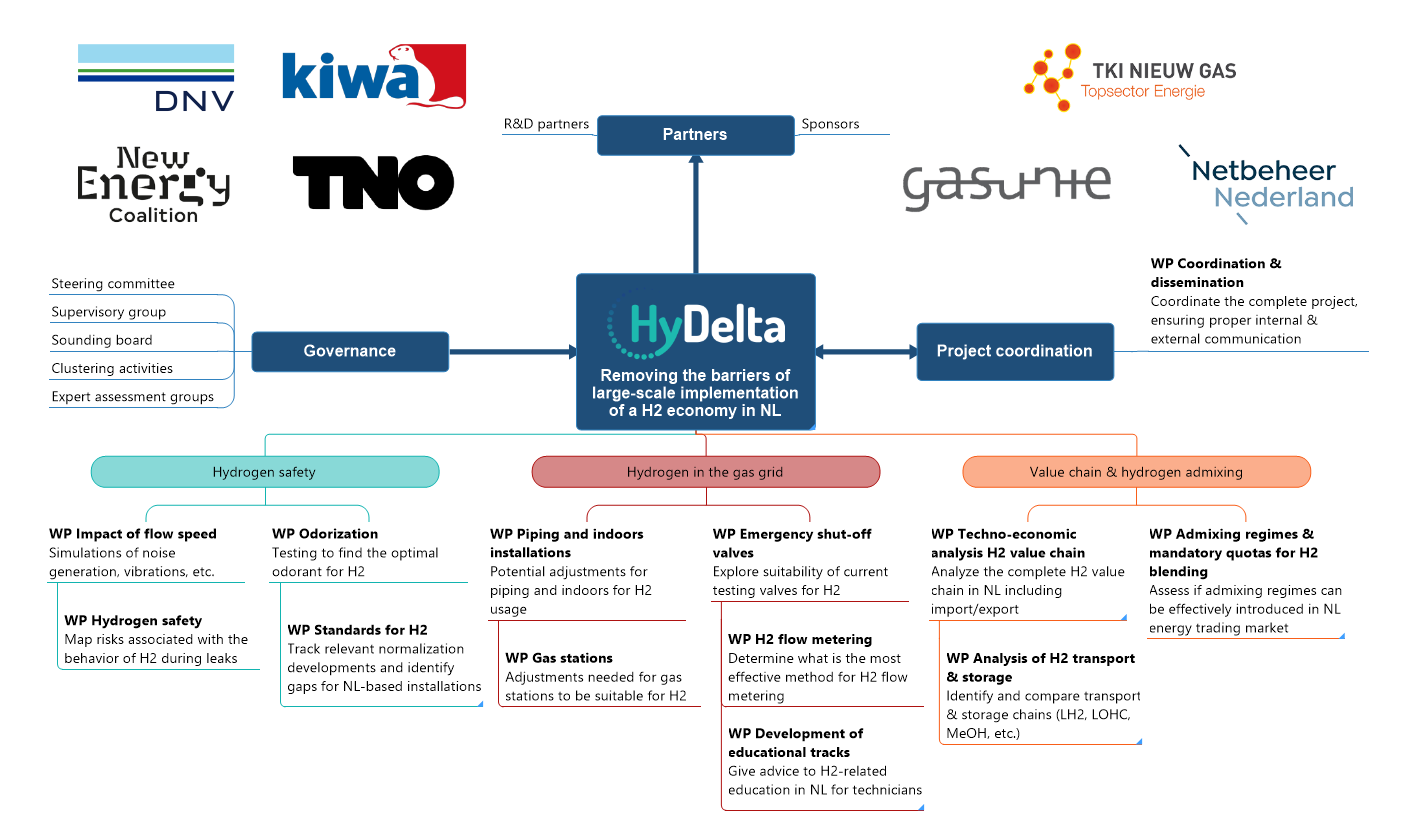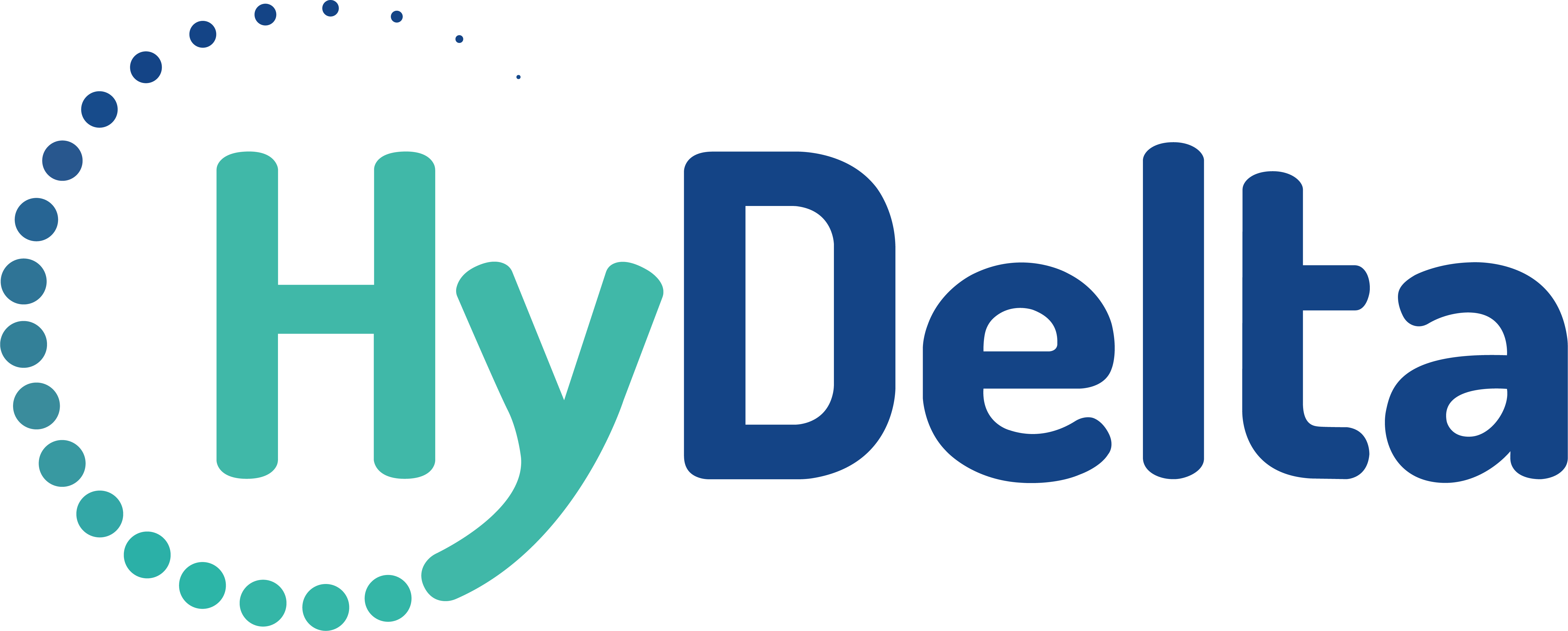HyDelta 1

Research programme
The HyDelta-programme is divided into Work Packages (WPs). Below is an overview of the research topics, with a link to a short description of each respective work package:
Below you can find a list of our presentations, webinars, and summary documents, as well as a link to download them:
| Type | Title | Publication Date | Link |
|---|---|---|---|
| Database | Summary of the references used in the HyDelta 1 project | 29-06-2022 | Link |
| Webinar | Kick-off meeting | 19-01-2021 | Link |
| Webinar | First plenary progress meeting | 30-06-2021 | Link |
| Webinar | Second plenary progress meeting | 07-12-2021 | Link |
| Webinar | Third plenary progress meeting / closing meeting | 17-06-2022 | Link |
| Summary | End of project summary | 06-10-2022 | Link |
Hydrogen safety
Safety is one of the most important aspects in the hydrogen economy both in the Netherlands and worldwide; therefore, we dedicate a significant part of the HyDelta research programme towards answering some of the most urgent and important questions about safety of hydrogen transport, that include questions both related to hydrogen in the built environment as well as questions independent of the mode of transport.
Below is a list of deliverables resulting from the aforementioned work packages, as well as a link to download them (when available):
WP1A: Hydrogen distribution and safety
Understand of the safety risks of hydrogen in the built environment and define appropriate mitigation actions for acceptable risks.| Number | Deliverable title | Publication date | Link |
|---|---|---|---|
| D1A.1 | Report with results from Hy4Heat, H21, Hyhouse, and interviews, translated to the Dutch situation | 06-10-2022 | Link |
| D1A.2 | Report with aditional questions for the Dutch situation and test program | 06-10-2022 | Link |
WP1E: Impact of high velocity of hydrogen flows
Simulation of potential effects of high-velocity hydrogen in the transmission and distribution networks| Number | Deliverable title | Publication date | Link |
|---|---|---|---|
| D1E.1 | Final report concerning the simulations of potential effects of high-velocity hydrogen in the transmission and distribution networks | 25-01-2022 | Link |
WP2: Odorisation of hydrogen
in search for the best odorant for hydrogen| Number | Deliverable title | Publication date | Link |
|---|---|---|---|
| D2.1 | Choice for a sulphur free odorant | 11-10-2021 | Link |
| D2.2 | Influence of sulphur containing odorant on end use appliances | 25-01-2022 | Link |
| D2.3 | Stability of odorants in hydrogen | 29-04-2022 | Link |
| D2.4 | Report on the risks of not odorizing hydrogen | 06-10-2022 | Link |
| D2.5 | Report with advice over odorizing hydrogen including a possible choice for a defined type of odorant and its dosing | 06-10-2022 | Link |
WP3: Standards and regulations
investigating the status of the development of standdards and regulations around hydrogen in the Netherlands| Number | Deliverable title | Publication date | Link |
|---|---|---|---|
| D3.1 | Report on the findings regarding the current standards for hydrogen, the ongoing standardization efforts, and a prioritization of standard development for hydrogen distribution | 24-03-2022 | Link |
Hydrogen in the gas grid
Hydrogen in the gas grid refers to the work packages in the HyDelta program carrying out specific questions about the operation, maintenance, and component selection for the transport of hydrogen in the existing gas transmission and distribution infrastructure. This work has been placed in the context of the existing standards and operating procedures of the Dutch gas transport system operators, but the results can be applicable to other gas transport systems in the world.
Below is a list of deliverables resulting from the aforementioned work packages, as well as a link to download them (when available):
WP1B: Gas stations
Safe working procedures around hydrogen in gas stations| Number | Deliverable title | Publication date | Link |
|---|---|---|---|
| D1B.1 | Operation of gas stations with spring loaded regulators with hydrogen | 19-04-2022 | Link |
| D1B.2 | Safety during maintenance works for hydrogen gasstations | 19-04-2022 | Link |
| D1B.3A | Suitability of the current ventilation in gas stations in the natural gas distribution network for hydrogen | 06-10-2022 | Link |
| D1B.3B | Potential explosion risks in current low-pressure gas stations when transporting hydrogen | 06-10-2022 | Link |
| D1B.4 | Report on insights about the effect of the increased gas velocity in hydrogen networks on the risk of an accelerated contamination of filters and subsequent mitigating strategies | 25-04-2022 | Link |
WP1C: Pipes and indoor installations
Safe working procedures around working with piping in distribution instlalations and in the built environment| Number | Deliverable title | Publication date | Link |
|---|---|---|---|
| D1C.1 | Purging of natural gas pipelines with H2 | 28-07-2021 | Link |
| D1C.1a | Entry of air into a hydrogen pipeline in case of a pipe rupture | 17-11-2021 | Link |
| D1C.2 | Leak-tightness of distribution pipes | 25-01-2022 | Link |
| D1C.3 | The influence of the existing natural gas distribution networks on the purity of hydrogen | 01-04-2022 | Link |
| D1C.4 | Domestic pressure regulators | 25-01-2022 | Link |
| D1C.5 | Insights in the risks to convert the current gas installations to 100% H2 and determining mitigating measures for these risks | 06-10-2022 | Link |
| D1C.6 | Development of 100%-hydrogen compatible domestic components | 25-01-2022 | Link |
WP1D: Metering of hydrogen
Evaluating potential options for gas flow meters for hydrogen fiscal metering in households| Number | Deliverable title | Publication date | Link |
|---|---|---|---|
| D1D.1 | Hydrogen flow metering for the built environment | 08-04-2022 | Link |
WP1F: Shut-off valves in the Dutch gas transmission grid
Testing of installed shut-off valves in the gas transmission grid for suitability with hydrogen| Number | Deliverable title | Publication date | Link |
|---|---|---|---|
| D1F.1 | Hydrogen compatibility of ball valves from the natural gas transmission grid | 29-04-2022 | Link |
WP4: Educational tracks -
Quantification and development of educational tracks for future technicians working in a hydrogen transmission and distribution system in the Netherlands| Number | Deliverable title | Publication date | Link |
|---|---|---|---|
| D4.1 | Overview of the requirements of education with an eye on the hydrogen economy | 21-03-2022 | Link |
Value chain & Hydrogen admixing
Besides the technical requirements for the transport of hydrogen in the existing gas transport infrastructure, the financial case needs to be proven. Furthermore, the inclusion of hydrogen as an extra fuel in the existing fuel trading and consumption systems i.e., the trading of certificates, the standards for admixing and the availability of subsidies and other policy instruments, will have consequences that we need to investigate before being able to provide a full picture of the potential of hydrogen as a booster to our economy. The value chain and hydrogen admixing work packages aim at investigating the state of the art of the hydrogen technologies, the potential business cases that exist aroud them, and an investigation into the topic of hydrogen admixing from a policy perspective.
Below is a list of deliverables resulting from the aforementioned work packages, as well as a link to download them (when available):
WP7A: Techno-economic value chain analysis
Analyzing the levelized cost of hydrogen (LCOH) of different value chains| Number | Deliverable title | Publication date | Link |
|---|---|---|---|
| D7A.1 | Hydrogen value chain literature review | 22-10-2021 | Link |
| D7A.2 | Techno-economic analysis of hydrogen value chains in the Netherlands: value chain design and results | 22-04-2022 | Link |
| D7A.3 | Summary for policymakers: hydrogen value chains in the Netherlands | 06-05-2022 | Link |
WP7B: Technical analysis of H2 supply chains
Mapping of the state of the art for hydrogen technologies and a subsequent roadmap for the ongoing technology development| Number | Deliverable title | Publication date | Link |
|---|---|---|---|
| D7B.1 | Database with the filled out factsheets about different componets of the H2 value chain elements to be modeled | 19-04-2022 | Link |
| D7B.2 | Accompanying report to D7B.1 where the factsheets are explained in more detail | 19-04-2022 | Link |
| D7B.3 | Cost analysis and comparison of different hydrogen carrier import chains and expected cost development | 03-05-2022 | Link |
| D7B.4 | A roadmap on transport and storage of hydrogen and hydrogen carriers for five sectors in the Dutch economy | 01-06-2022 | Link |
WP8: Admixing & mandatory blending -
Evaluating the existing Dutch policies regarding mandatory blending and certificates trading towards the creation of a hydrogen mandatory blendinbg and certificates trading system| Number | Deliverable title | Publication date | Link |
|---|---|---|---|
| D8.1 | Admixing literature review | 28-07-2021 | Link |
| D8.2 | Assessment Admixing Schemes | 13-10-2021 | Link |
| D8.3 | Pilots for introducing hydrogen blending quota | 11-02-2022 | Link |
| D8.4 | Economic analysis of potential market development in hydrogen certificate markets | 07-04-2022 | Link |
| D8.5 | Mandatory blending of hydrogen: summary for policy makers | 08-04-2022 | Link |

